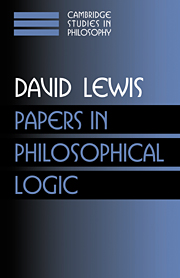Book contents
- Frontmatter
- Contents
- Dedication
- Introduction
- 1 Adverbs of quantification
- 2 Index, context, and content
- 3 ‘Whether’ report
- 4 Probabilities of conditionals and conditional probabilities II
- 5 Intensional logics without iterative axioms
- 6 Ordering semantics and premise semantics for counterfactuals
- 7 Logic for equivocators
- 8 Relevant implication
- 9 Statements partly about observation
- 10 Ayer's first empiricist criterion of meaning: why does it fail?
- 11 Analog and digital
- 12 Lucas against mechanism
- 13 Lucas against mechanism II
- 14 Policing the Aufbau
- 15 Finitude and infinitude in the atomic calculus of individuals (with Wilfrid Hodges)
- 16 Nominalistic set theory
- 17 Mathematics is megethology
- Index
14 - Policing the Aufbau
Published online by Cambridge University Press: 05 June 2012
- Frontmatter
- Contents
- Dedication
- Introduction
- 1 Adverbs of quantification
- 2 Index, context, and content
- 3 ‘Whether’ report
- 4 Probabilities of conditionals and conditional probabilities II
- 5 Intensional logics without iterative axioms
- 6 Ordering semantics and premise semantics for counterfactuals
- 7 Logic for equivocators
- 8 Relevant implication
- 9 Statements partly about observation
- 10 Ayer's first empiricist criterion of meaning: why does it fail?
- 11 Analog and digital
- 12 Lucas against mechanism
- 13 Lucas against mechanism II
- 14 Policing the Aufbau
- 15 Finitude and infinitude in the atomic calculus of individuals (with Wilfrid Hodges)
- 16 Nominalistic set theory
- 17 Mathematics is megethology
- Index
Summary
INTRODUCTION
Carnap's Aufbau sketches a remarkably ambitious construction. Given just one primitive phenomenal relation, he seeks to define enough concepts to provide a language adequate for all of science.
The constructed concepts are supposed to be coextensive with certain familiar ones. The Aufbau is commonly dismissed as a failure because discrepancies would appear under unfavorable circumstances. That verdict is premature. If there are few discrepancies under actual circumstances, the constructed concepts might be just as adequate for science as the familiar ones they approximate and replace. A mere chance of discrepancies is too bad, but not fatal. It would take frequent discrepancies to spoil the construction, by Carnap's own standards of success. The frequency has not been much investigated – understandably so; the needed computing power has become available only lately. Therefore it remains an open question whether the Aufbau succeeds or fails on its own terms.
If the original construction gives too many discrepancies, perhaps a more elaborate version would work better. The version presented, after all, is tentative; indeed it serves mostly as an illustration for Carnap's general discussion of logical constructions. There is plenty of room for improvement.
In particular, there are unexploited opportunities to police the construction. Spurious instances of a constructed concept, instances which do not fall under the familiar concept being approximated, often turn out to behave strangely later in the construction. Thereby they may be recognized as suspect and removed.
- Type
- Chapter
- Information
- Papers in Philosophical Logic , pp. 174 - 179Publisher: Cambridge University PressPrint publication year: 1997

